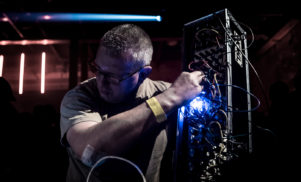For over 30 years, French producer In Aeternam Vale has been creating techno in parallel to everyone else.
Combining early synths and metronomic drum machine rhythms, founder Laurent Prot started out making punk in Lyon in the early ‘80s, but later went on to create electronic music that resembled the dark, atmospheric techno that would be created by artists such as Silent Servant many years later.
After languishing in obscurity for decades, Prot was brought into the public eye in 2009 by a retrospective on Veronica Vasicka’s Minimal Wave label. Since then, his music has found fans in techno heads and fans of vintage electronics alike, with the 1990 track ‘Ultrabase’, seen by some as an example of proto-dub techno that existed before Basic Channel.
Prot’s music-making methods have changed over the decades, but he’s still actively producing, with modern technology giving him the “ultimate weapons” he dreamed of having in the ‘80s to make music, including modular synths and drum machines, and software plug-ins. This month sees the release of his biggest project to date, a 3LP compilation of unreleased music released on on Parisian techno label DEMENT3D called Pink Flamingos. Collecting productions made between 1986 and 2013, it’s got plenty of the pulsating machine music you’d expect, but it’s also dronescapes and experimental pieces made with his modular system, software and array of vintage synths.
Ahead of the album’s release on June 6, I spoke to Prot about his early years and how he came to create techno in a vacuum. Listen to album track ‘181’ below.
Can you remember the first time you used a synthesizer?
Yes, I remember, it was in 1982 and it was a Yamaha CS01, it was red and small but I liked the sounds it made. I wanted to make electronic music because I had enough playing in punk bands. My idea was that I could be more creative with synthesizers and drum machines than with a guitar or a bass, and that I could produce wilder music.
Why did you decide to form In Aeternam Vale? Was there a political angle to what you were trying to do?
Before it became a solo project was built as a “regular” band with a singer, a guitarist, a bassist and a drummer. The idea was to play live and make each performance each time different from the previous one. We didn’t rehearse and had no song repertoire to play – just doing things live as it happens. The only political angle – if this could be a political angle – was to be out of everything, some kind of Dada nihilism.
Pink Flamingos collects music from the past 30 years. Have you been consistently recording music during that time?
Yes, that’s what I need – I feel myself more as a composer than a performer. It’s difficult to say how much music I made over 30 years, but it’s on hundreds of tapes and magnetic reels.
People have noted that your early music sounds like techno that wasn’t made until years later. Were you aware of Detroit techno at the time?
In the ‘80s I was listening to Yello, Throbbing Gristle, Kraftwerk, Birthday Party, Coil, The Art of Noise, The Toy Dolls, The Jesus and Mary Chain, Swans, but to be honest in the late ‘80s I stopped listening to music until 2005 or 2006. Only my friend was providing me some music to listen to and most of the time it was on tapes without any titles so I didn’t even know what I was listening to until I asked him.
I was aware that electronic musicians and producers were chasing TR-909 drum machines and TB-303 synths in the early ‘90s, but I wasn’t aware of what was going on in the techno world. I try to see myself as more inspired by machines than bands or producers because when I listen to music by other artists, I start to reproduce what I listen to. When I’m in front of a machine it’s like a white page – I need to start to write a story.
You’ve been playing more live shows recently. Has this changed the music you’re making into something more club-focused?
Yes, it affects the music I make, first because I have less time to compose and then because playing live is a repetitive exercise I’m not used to. I like to compose and to perform what I call “nodding music,” music that is connected to our body pulsations, our organic pulsations, heart and breathing, that makes your head nod when you listen to it. That’s a reason why I think my music works for clubs even if I feel clubs are very formatted.
People coming to clubs can be very formatted also, but it’s very different from a club to another and from a town to another – I’m always trying to experiment in clubs anyway and open them up to new sounds.






































